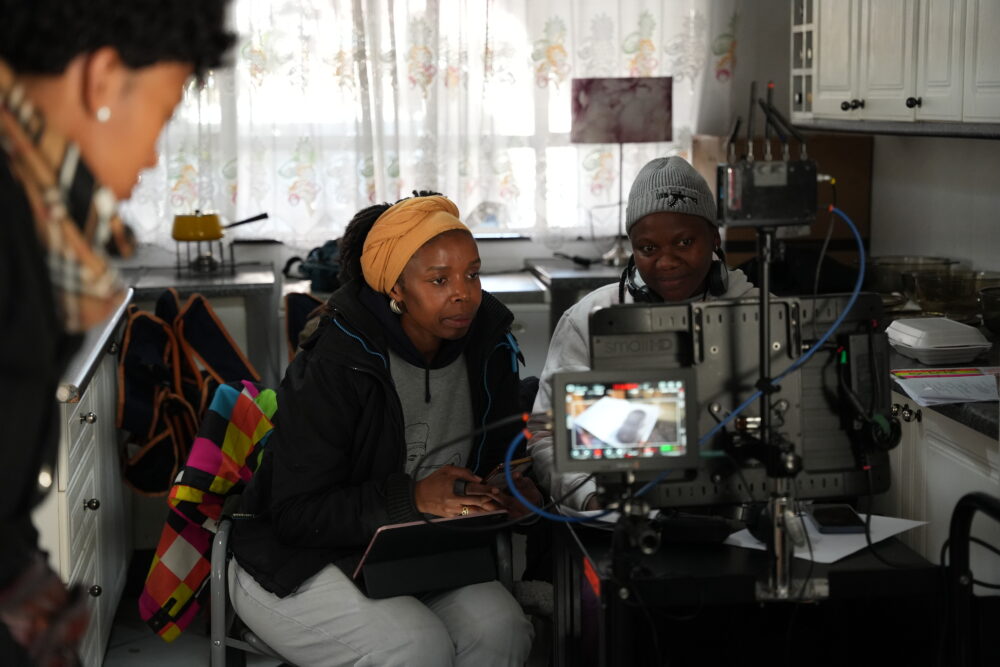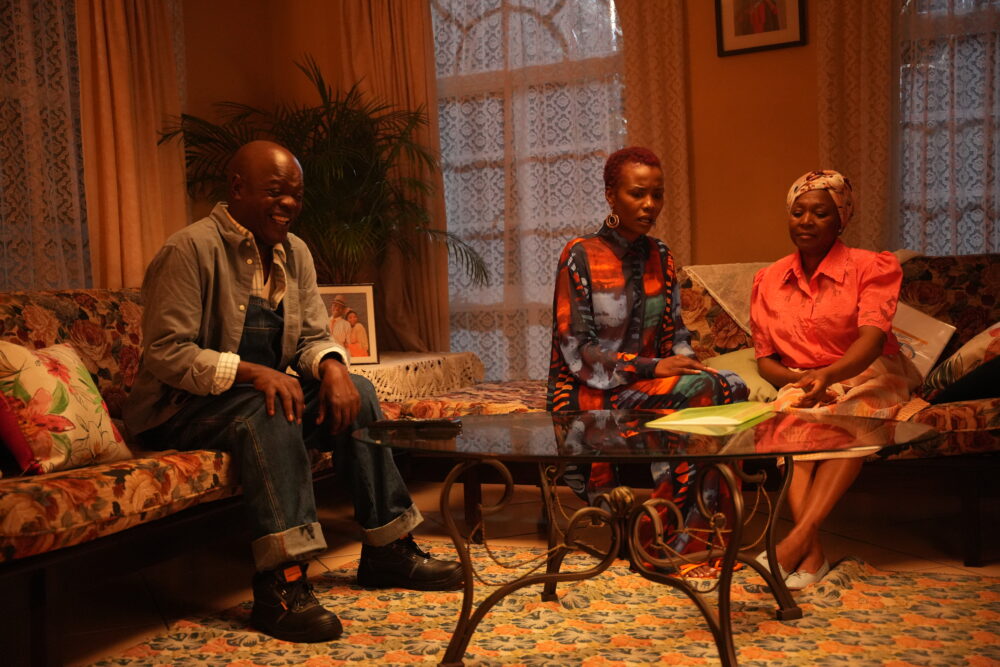Breathing space: Mona Monyane plays the lead character Lesego in the film Sabbatical, which explores themes such as the price of success and family pressures
We see a woman asleep in bed. She’s wearing make-up and earrings, so it’s clear the previous night must have ended abruptly. The puke stains on her pillow and the right side of her face point to the same conclusion.
She’s woken up by the incessant sound of hammering.
Not quite sure where the sound is coming from, or where she is for that matter, the only clarity available is the feeling of having been hit by a truck and barely surviving.
She slowly sits up on the bed, sunlight streaming through the curtains, and looks around the room. She realises where she is. The first words out of her mouth: “Oh, fuck.”
And with that, writer-director Karabo Lediga throws us right into the world of Sabbatical, her first feature film, set for nationwide release on 9 May.
The woman we are first introduced to in the throes of a historic hangover is Lesego, a successful investment banker. In the midst of a personal crisis, she has turned up at her childhood home, unannounced, telling her mother Doris that she’s taking a sabbatical from work.
The truth is that Lesego, once a rising star on the CEO track at top investment firm LouwFin, has been suspended and placed under investigation for defrauding a miners’ pension fund. She’s suspected of stealing millions from the families of deceased miners.
An investigator is hot on her heels and she’s fled her life in Johannesburg to seek the comfort of the familiar surroundings of her youth, 40km away, in Thorntree.
The setting for Sabbatical is a world Lediga knows well, having grown up in Pretoria herself, before moving to Johannesburg for university, and never quite returning, staying on to pursue a career in film and television. That is until major surgery forced her to move back home for a period of six weeks.
“I was just stuck in this room and I had to be kind of dependent on my mom,” Lediga says. “She’s a nurse, so she was rolling up her sleeves, like, ‘It’s my time to shine now.’”
 Debut: Director Karabo Lediga on the set of Sabbatical
Debut: Director Karabo Lediga on the set of Sabbatical
It was this experience that sparked the inspiration for what would become Lediga’s first feature film.
But the thread that really opened up the story was her desire to explore what she describes as a generational culture clash and how the pressure to succeed figures into that dynamic, particularly for black South African families.
“I’ve always thought about this pressure, this generational pressure to succeed, and I think it’s quite pronounced for the generation born right after apartheid because we were catapulted into worlds that weren’t accessible to our parents,” she says.
“The freedom is so pronounced. So, we become almost like foreigners in our own country, because we go to places that are predominantly white, where we’re a minority, and we come back home and we’ve changed.
“It’s almost like a culture clash between people in the same families and I’ve always found it fascinating.”
This idea comes out most strongly in the way Lesego, played by Mona Monyane, interacts with people in her hometown. They talk to her as though going to the city and becoming successful has made her different — perhaps even better — than them, when, in reality, Lesego feels crushed by the weight of expectation and is fleeing from the cost of success.
This sense of isolation is starkest in Lesego’s dynamic with her mother Doris, played by Clementine Mosimane. Even as she confesses the pressure of work has been getting to her, and seeks refuge in her mother’s home, Lesego is tight-lipped about the suspension and investigation.
And during the course of the film it’s not hard to see why as Doris seems less concerned with her daughter’s deteriorating mental health than with keeping up appearances.
“There are all of these questions you start to internalise when you were raised a certain way like, ‘Are you going to be presentable?’ and ‘What are people going to think?’ so I thought to exaggerate this relationship between Lesego and Doris,” explains Lediga. “I also think it’s interesting to look at our lives and the nuances of it. There’s something interesting about the in-betweens.”
Karabo Lediga started her film and television career as a researcher and writer working behind the scenes on several productions including Late Nite News with Loyiso Gola, Bantu Hour and Queen Sono.
She went on to direct the short film What Did You Dream?, which premiered at the Clermont-Ferrand International Short Film Festival, and was also in competition at The Palm Springs International Short Film Festival, among others.
 Seputla Sebogodi as Gabriel, Mona Monyane as Lesego and Clementine Mosimane as Doris in the movie
Seputla Sebogodi as Gabriel, Mona Monyane as Lesego and Clementine Mosimane as Doris in the movie
It won Best African Short at the Durban International Film Festival.
Her brother is the multi-hyphenate creative Kagiso Lediga, who is among the leaders of Diprente, the production house behind many of Karabo’s television and film credits and now her directorial debut Sabbatical.
Loyiso Gola also shows up in the film in a supporting role as the inscrutable investigator Percy, who is on the hunt for Lesego.
Lediga’s close connection to the world of comedy made me go into the film with the expectation that it would be a comedy. While it does have its funny moments, it’s more of a dramatic character study, a slow burn, slowly peeling back the layers of its complicated protagonist, her irritable mother and the colourful cast of characters in their Thorntree community.
“It’s interesting to talk about one’s voice as an African filmmaker because, internationally, there’s always this expectation that it will have this kind of stereotypical magical archetype people associate with Africa,” says Lediga. “But then I grew up on American television because the imperialism thrust upon me was American popular culture. And I’ve always loved the American indie — these films where white people get to just be themselves. There’s no fire. Nobody’s dying. It’s just exploring the psyche of characters, in depth.”
“So I’m always questioning: ‘What is it about black life that doesn’t deserve this kind of in-depth simplicity and nuance and humanisation?’
“Because people are just really people, you know. So I was quite obsessed with this indie thing that’s like a language in my style of filmmaking, or my burgeoning style of filmmaking, trying to make that kind of a film.
“I was obsessed with the question of what if this kind of borrowing of indie American filmmaking was to be in an African context with the nuances of black people.”
Lediga leaned heavily on her community of friends and long-time collaborators in the film industry to help her achieve her African indie vision. Sabbatical’s cinematographer Motheo Moeng is a Diprente regular who’s worked on films such as Catching Feelings and Matwetwe.
“What’s great about Motheo is that he also has Pretoria heritage, so he knows the world,” says Lediga. “But he also has an interesting connection with actors, making him a great representative for you as a director, when you’re not there.”
The film’s editor Khulekani Zondi worked on the television series Queen Sono as well as Matwetwe while Lethabo Mpoko, a young actress who has a supporting role in Sabbatical, was the lead in Lediga’s short film What Did You Dream?
The main cast is rounded out by Tsholofelo Maseko, Bathabile Mashigo and Seputla Sebogodi with production design by Ntokozo Kunene and an original score from award-winning South African jazz pianist and composer Bokani Dyer.
“There’s always this interesting question about, ‘What do you lean on?’ And the answer is community,” Lediga says.
“I guess that’s what the film says as well. The people around you matter — they are your currency.
“And it’s the people that you work with on set, the crew that you work with. I like to work with people that I already know and trust and have a relationship with and if we progress, then we should do it together.”